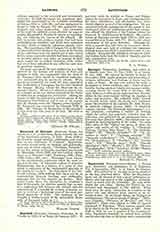

Raynouard, FRANCOIS-JUSTE-MARIE, a French poet, dramatist, and philologist, b. at Brignoles, Var, September 8, 1761; d. at Passy, October 27, 1836. He studied law at Aix and, on being admitted to the bar, practiced there. When the Revolution broke out, he showed at first a great enthusiasm for liberty and was elected to the Legislative Assembly, where he sided with the Girondins. He soon abandoned the new ideas. During the Terror, he was arrested and imprisoned at the Abbaye. Being freed after the ninth Thermidor, he returned to his native city and obtained great success as an attorney-at-law. In his leisure hours, he indulged in writing poems, “Socrate au temple d’Aglaure” (1802), and tragedies, “Eleonore de Baviere” and “Les templiers”, which were played in 1805 by special command of Napoleon. Their success caused him to be elected to the French Academy in 1807. From 1806 to 1814, he was a member of the Legislature. After Napoleon’s downfall, he retired from politics and devoted his time to literature and a comparative study of languages. He was one of the pioneers of Romance philology and made a lasting reputationby his researches on the troubadours, although his conclusions now seem hasty and often mere conjectures. He was admitted to the Academy of Inscriptions and Belles-Lettres in 1815. His chief works besides the dramas above mentioned are the tragedy “Les États de Blois” (1809), and a few others never produced on the stage: “Catond’Utique”, “Don Carlos”, “Debora”, “Charles I”, “Jeanne d’Arca Orleans”; various contributions to Romance philology: “Recherchessur l’antiquite dela langue romane (Paris, 1816); “Elements de lagrammaire de lalangue romane” (Paris, 1816); “La grammaire des troubadours” (1816); “Des troubadours et les cours d’amour” (1817); “Grammaire paree des langue de l’Europe latine clans leurs rapports avec la langue des troubadours” (1821); “Choix des poesies originales des troubadours” (Paris, 1821); “Lexique de la langue des troubadours” (Paris, 1824); “Nouveau choix des poesies originales des troubadours” (Paris, 1836-44).
LOUIS N. DELAMARRE

